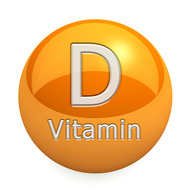Cancer

Vitamin D fights pancreatic cancer
Sept 1, 2016
By Christine Clark
A report published in Case Reports in Pancreatic Cancer suggests that taking high dose vitamin D supplements may help stabilize pancreatic cancer even without use of conventional treatments.
Pancreatic cancer is linked to high mortality. The disease is so dangerous that only about 7% of patients are expected to survive for more than five years after diagnosis. That is why anything that can help fight the disease would be desired.
The report says a woman with pancreatic cancer errantly took a vitamin D supplement in a dose of 50,000 U daily and as a result, her serum vitamin D concentration reached at more than 150 mg/mL (This is according to the report. The concentration seems to be impossibly high. Could it be 150 ng/mL?).
And the patient did not experience any clinical symptoms or side effects associated with this high dose of vitamin D. It is not clear how long the patient took the vitamin D supplement in this dose. Keep in mind that long term intake of high doses of vitamin D can be risky even though moderate levels of vitamin D can be beneficial.
The surprise is that her pancreatic cancer was stable for eight months without conventional treatments. The authors wondered if this high dose of vitamin D provided some protective effect against the disease in this case.
http://www.foodconsumer.org/newsite/Nutrition/Vitamins/vitamin_d_fights_pancreatic_cancer_0901160913.html
Vitamin D fights pancreatic cancer
Sept 1, 2016
By Christine Clark
A report published in Case Reports in Pancreatic Cancer suggests that taking high dose vitamin D supplements may help stabilize pancreatic cancer even without use of conventional treatments.
Pancreatic cancer is linked to high mortality. The disease is so dangerous that only about 7% of patients are expected to survive for more than five years after diagnosis. That is why anything that can help fight the disease would be desired.
The report says a woman with pancreatic cancer errantly took a vitamin D supplement in a dose of 50,000 U daily and as a result, her serum vitamin D concentration reached at more than 150 mg/mL (This is according to the report. The concentration seems to be impossibly high. Could it be 150 ng/mL?).
And the patient did not experience any clinical symptoms or side effects associated with this high dose of vitamin D. It is not clear how long the patient took the vitamin D supplement in this dose. Keep in mind that long term intake of high doses of vitamin D can be risky even though moderate levels of vitamin D can be beneficial.
The surprise is that her pancreatic cancer was stable for eight months without conventional treatments. The authors wondered if this high dose of vitamin D provided some protective effect against the disease in this case.
http://www.foodconsumer.org/newsite/Nutrition/Vitamins/vitamin_d_fights_pancreatic_cancer_0901160913.html
